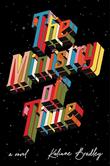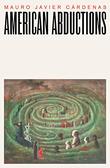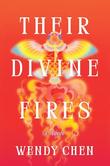
by Joy Williams ‧ RELEASE DATE: Sept. 14, 2021
An enigmatic, elegant meditation on the end of civilization—if end it truly is.
Awards & Accolades
Our Verdict

GET IT
Kirkus Reviews'
Best Books Of 2021
Kirkus Prize
winner
A memorable return for renowned storyteller Williams after a lengthy absence from long-form fiction.
“Something definitely had gone wrong. Even the dead were dismayed.” Something has gone wrong indeed, but in her first novel in 20 years, Williams doesn’t reveal the precise contours of what that something is. There are portents at the outset as the young girl known first as Lamb, then as Khristen, contemplates a bit of family lore recounting that as a newborn she was resuscitated after having stopped breathing and, thus reborn, “was destined for something extraordinary.” So Khristen’s mother believes, in any event, sending her to a boarding school where, Khristen says, “my situation would be appreciated and the alarming gift I had been given properly acknowledged.” Instead, the school dries up, for by Khristen's third year there are no incoming students. Why? There’s no resolution in sight anywhere in Williams’ deliberately paced pre–post-apocalyptic novel: All the reader knows is that something is definitely off, signaled by such moments as when a fellow student, asked to contemplate an orange while pondering creativity, protests, “I haven’t tasted an orange in years.” Khristen takes her place in an odd community on a “razed resort” alongside a dying lake known as Big Girl, populated by the likes of a gifted, spooky 10-year-old and a Vicodin-swilling matriarch named Lola. If nothing else, the place has a working bowling alley, one good place to await doomsday. As the clock ticks away, Williams seeds her story with allusions to Kafka, bits of Greek mythology, philosophical notes on the nature of tragedy, and gemlike description (“He was in excellent physical condition, lean with rage”), and all along with subtly sardonic humor: Williams’ imagined world of the near future is so thoroughly corporatized that even the blades of wind turbines have advertisements on them, and she offers a useful phrase for obituaries to come: “What did he die of?” one character asks, meeting the reply: “Environmental issues.”
An enigmatic, elegant meditation on the end of civilization—if end it truly is.Pub Date: Sept. 14, 2021
ISBN: 978-0-525-65756-9
Page Count: 224
Publisher: Knopf
Review Posted Online: June 15, 2021
Kirkus Reviews Issue: July 1, 2021
Share your opinion of this book
More by Joy Williams
BOOK REVIEW
by Joy Williams
BOOK REVIEW
by Joy Williams
BOOK REVIEW
by Joy Williams
More About This Book
PERSPECTIVES
PERSPECTIVES

by Max Brooks ‧ RELEASE DATE: June 16, 2020
A tasty, if not always tasteful, tale of supernatural mayhem that fans of King and Crichton alike will enjoy.
Awards & Accolades
Likes

144
Our Verdict

GET IT
New York Times Bestseller
Are we not men? We are—well, ask Bigfoot, as Brooks does in this delightful yarn, following on his bestseller World War Z(2006).
A zombie apocalypse is one thing. A volcanic eruption is quite another, for, as the journalist who does a framing voice-over narration for Brooks’ latest puts it, when Mount Rainier popped its cork, “it was the psychological aspect, the hyperbole-fueled hysteria that had ended up killing the most people.” Maybe, but the sasquatches whom the volcano displaced contributed to the statistics, too, if only out of self-defense. Brooks places the epicenter of the Bigfoot war in a high-tech hideaway populated by the kind of people you might find in a Jurassic Park franchise: the schmo who doesn’t know how to do much of anything but tries anyway, the well-intentioned bleeding heart, the know-it-all intellectual who turns out to know the wrong things, the immigrant with a tough backstory and an instinct for survival. Indeed, the novel does double duty as a survival manual, packed full of good advice—for instance, try not to get wounded, for “injury turns you from a giver to a taker. Taking up our resources, our time to care for you.” Brooks presents a case for making room for Bigfoot in the world while peppering his narrative with timely social criticism about bad behavior on the human side of the conflict: The explosion of Rainier might have been better forecast had the president not slashed the budget of the U.S. Geological Survey, leading to “immediate suspension of the National Volcano Early Warning System,” and there’s always someone around looking to monetize the natural disaster and the sasquatch-y onslaught that follows. Brooks is a pro at building suspense even if it plays out in some rather spectacularly yucky episodes, one involving a short spear that takes its name from “the sucking sound of pulling it out of the dead man’s heart and lungs.” Grossness aside, it puts you right there on the scene.
A tasty, if not always tasteful, tale of supernatural mayhem that fans of King and Crichton alike will enjoy.Pub Date: June 16, 2020
ISBN: 978-1-9848-2678-7
Page Count: 304
Publisher: Del Rey/Ballantine
Review Posted Online: Feb. 9, 2020
Kirkus Reviews Issue: March 1, 2020
Share your opinion of this book
More by Max Brooks
BOOK REVIEW
by Max Brooks
More About This Book
BOOK TO SCREEN

by Percival Everett ‧ RELEASE DATE: March 19, 2024
One of the noblest characters in American literature gets a novel worthy of him.
Mark Twain's Adventures of Huckleberry Finn as told from the perspective of a more resourceful and contemplative Jim than the one you remember.
This isn’t the first novel to reimagine Twain’s 1885 masterpiece, but the audacious and prolific Everett dives into the very heart of Twain’s epochal odyssey, shifting the central viewpoint from that of the unschooled, often credulous, but basically good-hearted Huck to the more enigmatic and heroic Jim, the Black slave with whom the boy escapes via raft on the Mississippi River. As in the original, the threat of Jim’s being sold “down the river” and separated from his wife and daughter compels him to run away while figuring out what to do next. He's soon joined by Huck, who has faked his own death to get away from an abusive father, ramping up Jim’s panic. “Huck was supposedly murdered and I’d just run away,” Jim thinks. “Who did I think they would suspect of the heinous crime?” That Jim can, as he puts it, “[do] the math” on his predicament suggests how different Everett’s version is from Twain’s. First and foremost, there's the matter of the Black dialect Twain used to depict the speech of Jim and other Black characters—which, for many contemporary readers, hinders their enjoyment of his novel. In Everett’s telling, the dialect is a put-on, a manner of concealment, and a tactic for survival. “White folks expect us to sound a certain way and it can only help if we don’t disappoint them,” Jim explains. He also discloses that, in violation of custom and law, he learned to read the books in Judge Thatcher’s library, including Voltaire and John Locke, both of whom, in dreams and delirium, Jim finds himself debating about human rights and his own humanity. With and without Huck, Jim undergoes dangerous tribulations and hairbreadth escapes in an antebellum wilderness that’s much grimmer and bloodier than Twain’s. There’s also a revelation toward the end that, however stunning to devoted readers of the original, makes perfect sense.
One of the noblest characters in American literature gets a novel worthy of him.Pub Date: March 19, 2024
ISBN: 9780385550369
Page Count: 320
Publisher: Doubleday
Review Posted Online: Dec. 16, 2023
Kirkus Reviews Issue: Jan. 15, 2024
Share your opinion of this book
More About This Book
PERSPECTIVES
PERSPECTIVES
© Copyright 2024 Kirkus Media LLC. All Rights Reserved.
Hey there, book lover.
We’re glad you found a book that interests you!
We can’t wait for you to join Kirkus!
It’s free and takes less than 10 seconds!
Already have an account? Log in.
OR
Trouble signing in? Retrieve credentials.
Welcome Back!
OR
Trouble signing in? Retrieve credentials.
Don’t fret. We’ll find you.





